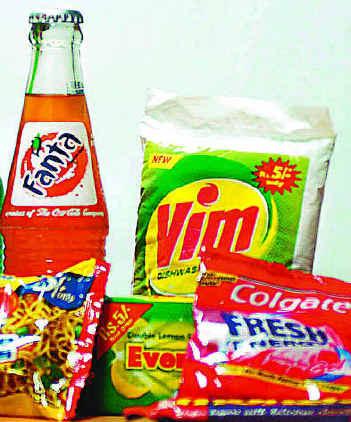| The corner shop, as it grapples with the onslaught of big retail, has found formidable allies. At least three fast-moving consumer goods companies — Mumbai-based Hindustan Unilever and Marico and Delhi-based Dabur — have developed new brands and attached them to mom-and-pop stores and given them the same deal as large retail outlets. |
| In return, the companies get high visibility and dominant display for their products which, according to claims, has led to a 20 per cent rise in sales in some cases. |
| Hindustan Unilever is associating with small-format retail through its Super Value Store, Dabur with Parivaar and Marico with Mera. At many shops, the counter has been modified into a U or L shape so that the shopper can move and pick items, just like in large retail stores. |
| Market research reports say 25-40 per cent of consumers switch brands at the point of sale driven by display or promotion. As much as 95 per cent of FMCG sales in the country are through small shops. |
| In Mumbai, Marico has covered its top 10 per cent of sales points under Mera. “The sales of Marico’s products have improved by 20 per cent as they get preference in display,” said a retailer associated with Mera. |
| HUL, under its Super Value initiative, is providing consultancy to retailers on how to morph into self-service stores. In case a store does not have enough space, it is given advice on prioritising product display, inventory management, etc. |
| "The purpose of this programme is to activate the general trade channel keeping shopper behaviour in mind,” says Ishmeet Singh, general manager, customer marketing, Hindustan Unilever. |
| Put simply, general trade is sale through small shops while modern trade is through large retail stores. |
| "Under the Mera programme, we ensure that our small retailers get the same benefits as modern trade or more,” says Saugata Gupta, chief executive officer, consumer products, Marico. |
| Dabur, through Parivaar, is aiming at building long-term relationship with grocery stores across major cities. Special discounts, higher margins and rewards are part of it. |
| “We are rolling it out in a phased manner and around 5,000 key grocery outlets across 15 major cities are being covered in the first phase. By the end of the current fiscal, we intend to take it up to 12,000 outlets,” said a Dabur executive. |
Sunday, September 30, 2007
FMCG firms ally with kirana stores
Subscribe to:
Post Comments (Atom)





1 comment:
Post a Comment